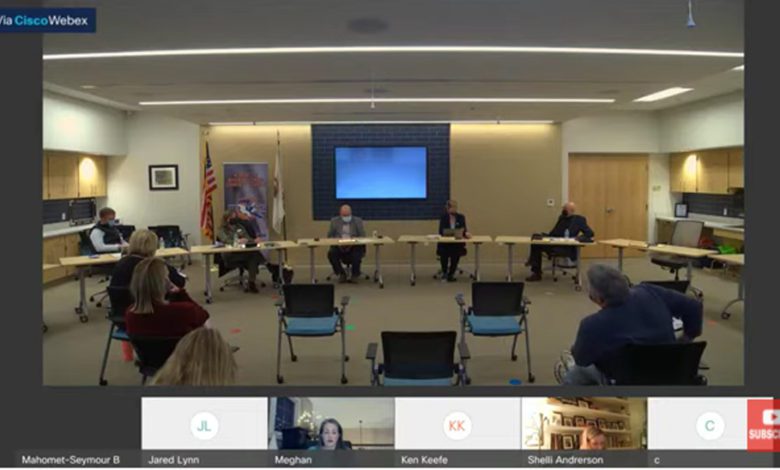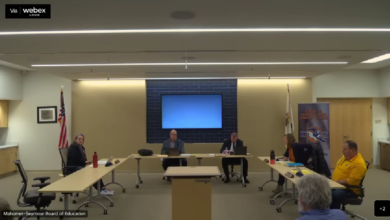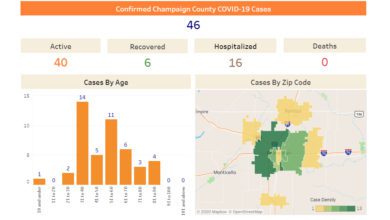Mahomet-Seymour to provide assistance with dual credit fees to families in need

Mahomet-Seymour families in need of financial assistance will be able to have the cost of dual credit courses taken care of by the district beginning in the 2021-22 school year.
The move comes after Parkland College passed a fee for the dual credit courses onto high schools. Mahomet-Seymour Administration brought a measure to the board of education in January to pass those fees onto the student or family.
“This is a new fee they are passing on to us. So we’re just asking that we pass that on to the families that are receiving the college credit report,” Rummel said.
The district always intended to cover the cost of the course(s) for students on the free and reduced lunch program.
In their first vote, which was split 3-3 (board member Jeremy Henrichs was absent), board members Colleen Schultz, Meghan Hennesy and Ken Keefe pushed for the district to absorb the cost of the dual credit courses so that all students would feel like they could access the program.
Director of Instruction Nicole Rummel said that she brought the measure back to the Feb. 22 special board meeting “to clarify that the district will be covering the costs for families that are unable to pay the fees for the dual credit.”
“I received some emails from people in the community, saying that they did not believe that we shouldn’t be charging families and students that could not afford to take the classes and thus potentially pushing kids out of classes that they wanted to take,” Rummel said. “So I feel like I’m clarifying that misinformation.”
Schultz asked Rummel to clarify how the district would know if a family needed help.
Rummel said that although the district planned to cover the free-and-reduced lunch students, any family that needed assistance could reach out to the district.
“I’ve never questioned the family’s hardship, We cover the costs,” she said.
“We’ve also worked with families in various circumstances, come up with a payment plan,” Superintendent Lindsey Hall added. “The goal here is not to exclude the goal is to help.”
Hall said that the district would communicate with families to come up with solutions.
Board members Merle Giles and Max McComb stressed that the dual credit courses through the high school would come at a significantly decreased cost than if they were to take it through another college or university.
But Schultz said that she fears students would be disincentivized to take a college-level course during high school if they had to ask for financial assistance, even if the course had a $100 fee associated with it.
Schultz suggested that the course could be presented with a suggested donation fee. That way families that could afford it would pay it.
“I think that there are a lot of students who have families that don’t meet the requirement for the free lunch program because it’s a pretty low requirement,” Keefe said. “But there are still people that 100-and-some dollars is a lot of money; especially at the start of the year, when you’ve got all these other registration fees and book fees that they also are not qualified to have waived. I think there’s a real need there. There’s kind of like a doughnut hole between people who have the resources to pay fees and not basically not sweat it and people who are covered by these free lunch programs.”
Giles said that the “language of donation versus fee is just possibly misguided because no one’s going to go to Parkland and enroll with a donation.”
Part of the discussion went into if a public K-12 institution is responsible for providing the college credit courses. Rummel said that Mahomet-Seymour does provide a physics course outside of the dual credit program, including an AP physics course.
Keefe said that students could enroll in the AP course without taking the placement test, but wanted to know if students could still enroll in the college-level physics course, for example, just to learn the material. Students at Mahomet-Seymour are responsible for the AP test fee.
“They’re not disincentivized by the AP course,” Keefe said. “But it sounds like the material and the sequence provided by these partland dual credit classes are not matched somewhere else in our curriculum.”
Rummel said she would check to see if students could take the dual credit course, taught by Mahomet-Seymour teachers, without receiving dual credit.
But Rummel said that the transfer of the AP course to a college credit isn’t always cut-and-dry. The dual credit courses, a credit from Parkland College, is.
“We have a duty to provide a K-12 education,” McComb said. “We don’t have a duty to provide a Parkland education. That’s the difference.
“They pay the reduced, bargain Parkland price.”
“And we give all the students three logical choices,” Giles added.
“Or the next year they can go to Parkland and pay the regular rate..or they can go to another university.”
“It’s not our duty to subsidize what goes on at the college level,” Giles said.
Schultz suggested that there were ways to find money in the budget to make it so that students could take the course without a fee. She noted that the district budgets $10,000 each year to go to the IASB annual conference. By eliminating that cost, she said the district could pay for the fees without passing the cost on for the next two years.
Giles said that that money could also go to hire Special Education teachers.
Schultz amended the original motion to state that the district would cover fees in full for any students who cannot pay.
“We just have been discussing for a long time,” Schultz said. “And we’ve said that the district will cover for any students who cannot pay. And so that’s what we’re saying we should put that into our motion.”
Henrichs said that people can just come to the district and ask for assistance.
“We’ve got some definite criteria that we’ve gone by. And if we can trust our administrators to work out with families that are unable to pay. This is a workable solution. It’s kind of like making this overly complex. When it could be very simple. We already have the exception to handle those who cannot pay in good practice.”
Giles said he wouldn’t want to give up automatically doing something for students on free and reduced lunch.
Schultz’s amendment was voted down 4-3 with Hennesy, Keefe and Schultz voting in favor.
Schultz amended the original motion again, stating that “(The Mahomet-Seymour School District) will pay fees in full, or in part for qualifying students, or any student, unable to pay.
“We’re saying that’s what we’re willing to do,” Schultz said. “I don’t understand why we wouldn’t be willing to put it in our motion. It gives me pause as to why we wouldn’t want a bigger motion, but we say we want to do.”
“I don’t have any problem with that,” Henrichs said. “It essentially says we’re doing what we say we’re going to do.”
The measure was passed unanimously.




